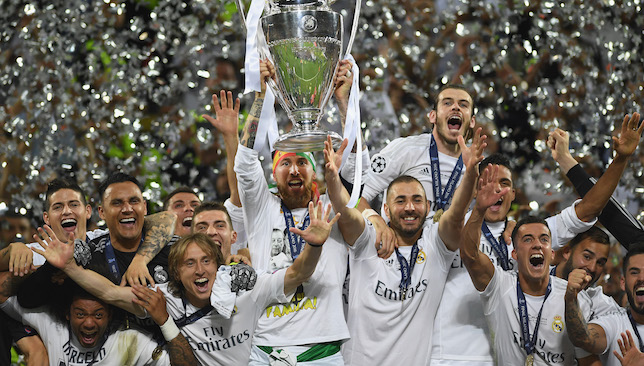
Real Madrid and Sevilla in 2014; Barcelona and Sevilla in 2015; Real Madrid and Sevilla yet again in 2016….when it comes to the endless debate over which is the best football league in the world, the identity of recent Champions League and Europa League winners is surely all the evidence you need.
And when you also consider that Atletico Madrid have appeared in two Champions League finals, with Villarreal, Valencia and Athletic Bilbao all reaching at least the Europa League semi-finals since 2012, the oft-repeated argument that La Liga “lacks depth” doesn’t hold much weight either.
By any objective standards, Spanish football’s current dominance of European football is beyond reasonable doubt, with no other league even coming close.
In stark contrast, clubs from the English Premier League have been failing badly, only able to point to Liverpool’s losing appearance in last season’s Europa League and Chelsea’s victories in the Europa League (2013) and Champions League (2012) in the last five years.
Even former Manchester United midfielder Paul Scholes, one of the Premier League’s most illustrious talents of the 21st century and now a television pundit for the competition, this week bemoaned the standards of English football while hailing La Liga as “by far” the best in the world.
Really, the only sensible question is not whether La Liga provides the highest quality football, but for how much longer it can retain that status in the face of the Premier League’s increasing financial might.
Belatedly, Spanish authorities have recognised the need to allow their clubs to remain competitive, introducing significant changes to the distribution of television broadcasting rights, which were previously extremely heavily weighted in favour of Barcelona and Real Madrid. But the money paid out to most Spanish clubs will still be dwarfed by the earnings of their equivalents in the Premier League, meaning the annual exodus of talent from Spain to England – which this summer included Shkodran Mustafi, Lucas Perez, Borja Baston, Nolito and Eric Bailly – will only continue.
Paul Scholes: "You hear people say English football is the best. I think La Liga is by far the best league."
— Leo Messi (@messi10stats) September 6, 2016
💯 true pic.twitter.com/e1cgBdGJdF
La Liga president Javier Tebas is not blind to the problem, telling a conference earlier this year that he is fearful the Premier League could become “the NBA of football” – consistently hoovering up the best talent and eventually preventing any other league from competing.
“We need investors, people who want to share their wealth, so that other leagues don’t take talent from our clubs,” he said. “If that happens, we’ll be as good as dead.”
And the long-established Premier League practice of seeking foreign wealth is now becoming commonplace in La Liga, with Granada and Espanyol both taken over by Chinese corporations in the last few months.
The Big Two are also stepping up their efforts in the global marketplace – illustrated by Barcelona’s opening of a club office in New York City this week – but the Catalan giants remain highly concerned that their efforts to stay on the same financial footing as English counterparts may be doomed.
When the Premier League’s new mega-bucks television deal was announced earlier this year Barcelona president Josep Maria Bartomeu confessed: “Premier League teams will have an incredible financial situation from now on and we are worried. We have to increase our revenues,” he told the BBC. “I am so worried and we are working on this. We want to keep the talent at home.”
Riches, however, aren’t everything. After all, the Premier League has already enjoyed a considerable financial advantage for a number of years but, if anything, the quality of its football has decreased.
Money doesn’t count for much if it is routinely wasted and Matt Law, football news correspondent for the Daily Telegraph, “100 per cent” believes the haphazard recruitment policies which have been employed by many English clubs are to blame.
“I do not think the so-called big clubs in England have bought particularly well in recent years,” said Law. “Manchester City and United have squandered millions, although their transfer strategies improved markedly over the summer.”
Looming ever-present in the background is the ongoing threat of a European Super League, which could be forced through by major European teams in a last-ditch bid to prevent English clubs completely dominating. That will largely depend upon the ability of La Liga, Serie A, Ligue 1 and the Bundesliga to generate enough income to keep their major clubs happy.
And, of course, it will depend upon results on the pitch. With superstars such as Paul Pogba and Zlatan Ibrahimovic, and elite tacticians Pep Guardiola, Antonio Conte and Jurgen Klopp all now in England, Premier League fans are optimistic that their fortunes will soon change.
“There are tactical aspects which English football is still behind on,” admits Law. “Defensively, the Premier League has been poor for a while and that must improve if clubs are to succeed in Europe.
“But I think it will get better this season with the managers and players that have come over.”
We will, of course, have an early opportunity to see whether the performance gap is being narrowed when Guardiola takes Manchester City to face his old club, Barcelona, in the Champions League group stage next month.
One game counts for very little, of course. But if City can overturn their recent record against the La Liga champions – four games, four losses – it could be a symbolic sign of impending change.
For too long, the Premier League has underachieved. But the tide might be about to turn, and the repercussions could be dramatic.